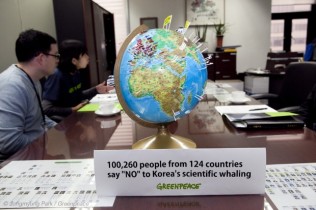The South Korean government has abandoned plans to begin scientific whaling following domestic and international resistance. Scientific whaling involves the killing of whales for the purpose of research – a practice environmentalists dismiss as a thinly veiled cover for illegal commercial whaling operations. More than 100,000 concerned citizens from 124 countries signed an online petition calling for South Korea’s whaling plan to be abandoned. The petition was delivered to the South Korean Prime Minister’s office in late November.
“The voices of people from South Korea and the entire world have been heard by the South Korean government,” Greenpeace East Asia oceans campaigner Jeonghee Han said in a press release. “The South Korean government’s decision to not take up scientific whaling is another sign that commercial whaling has no place in our oceans. We urge South Korea to abandon all commercial whaling activities in the future.”
The proposal needed to be submitted to the International Whaling Commission (IWC) by December 3, 2012, in order to be considered at the next meeting, currently set for June 2013. According to Greenpeace, once a “research” proposal has been submitted, the IWC can only comment on, not block, it. Had the proposal gone ahead, whaling could have commenced as early as mid-2013.

“In Korea hundreds of minke whales are killed every year and their meat is traded along the east coast, especially around Ulsan,” Han wrote in a recent blog post. “Whale counts are incomplete but what information there is suggest[s] that the minke whales, which are classified as protected, are declining 5 to 7 percent each year. ”
The port of Jangsengpo, near the metropolitan city of Ulsan on the southeast coast, was Korea’s biggest whaling port during the 20th century, before whaling was banned in the area in 1986. Myung Ae Choi, a doctoral candidate at the School of Geography and the Environment at the University of Oxford, recently conducted extensive fieldwork on the effects of whaling in the Ulsan area, and found that many of the local residents miss the “glory” days. She says, “Many locals—whose majority is over middle-aged—miss the whaling period in 1960s and 70s with nostalgic sense as it was the heyday of the area. For the locals, resumption of whaling is the way to get the “glory’ back. But it is a bit pathetic as there is no significant whaling industry left except small-scale illegal whaling.”
Whale-based tourism, however, is still popular in the area. The local government runs a variety of tours, including whale-watching boat trips, and visits to a dolphin aquarium and a whale museum. Yet there’s also another element: at the end of their tour tourists can opt to visit a whale-meat restaurant. Whale meat has long been considered a local delicacy, and has traditionally only been available to wealthy individuals. Eating whale meat is therefore advertised as a “privileged experience.”
“There are over 30 restaurants serving whale meat,” Choi explains. “The price varies, but is approximately US $15 to 25 per person. Given that a regular meal in this area costs about US $8 per person, whale meat is quite expensive.” According to Choi, the majority of tourists who visit the region are Korean nationals.
As whaling is officially banned, whale meat is currently only supplied via “by-catch,” which is the unintentional death of whales entangled in nets. However, a recent Sea Shepherd Conservation Society editorial argues that South Korean regulations encourage “deliberate “by-catch,’ whereby whales are intentionally killed by netting or left to drown by fishermen when they become entangled in their nets “by accident.'”
Choi also reports allegations of increases of illegal whaling in order to meet the increased need for whale-meat. “So, strangely enough, the more whale-related tourism, the more whale sacrifice takes place,” she says.
Greenpeace’s Han says there has been no official announcement from South Korea’s government about withdrawing the scientific whaling proposal, due to conflicting interests, particularly those of local fishermen. Choi confirms that the situation in the area is increasingly complex, saying, “The strange coexistence of whaling and whale-watching tourism in this area is extremely complicated—it has (post) colonial relations with Japan, urban-local inequality, confliction between traditional-modern environmental thoughts and so forth.”
Read Ethical Traveler's Reprint Policy.
